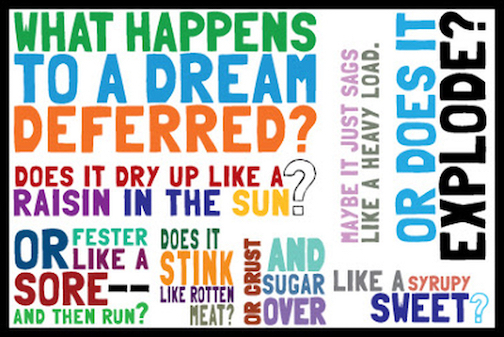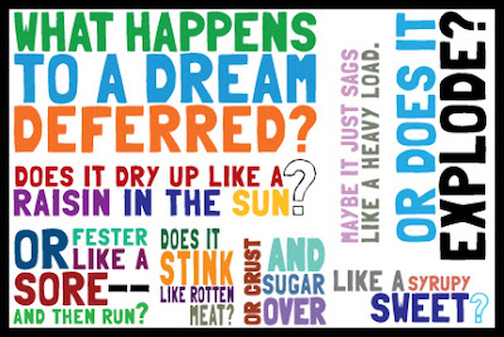
What happens to a dream deferred?
Does it dry up
like a raisin in the sun?
Or fester like a sore–
And then run?
Does it stink like rotten meat?
Or crust and sugar over–
like a syrupy sweet?
Maybe it just sags
like a heavy load.
Or does it explode?
Over half a century later, the 1951 Langston Hughes poem, Harlem, describes the mood in the United States. The lives of the average American have not kept pace with the dream, and they are festering, sagging, and angry. Some in mainstream media have zeroed in on politicians who make promises that they cannot keep as the culprits, throwing Donald Trump, Ted Cruz and strangely Bernie Sanders into their dichotomous caldron of left-right blame. They yearn for the reemergence of the long-gone, moderate Republicans and for Democrats to re-coalesce around centrism. Talking like they are the real grownups, they call for “realists” not dreamers. The purveyors of authoritarian, racist, and xenophobia solutions are indeed condemnable. I am waiting for mass denunciation from religious leaders. But we still need dreamers who promise a better future.
However, not all dreamers are created equal. Among the promisors we have liars, cynics and hopers. Education is a great example.
Liars: We have promisors who, in the technology-evoking name of disruptive innovation, want to dismantle publically funded, democratically governed education and turn it all over the to forces of the market. They try to wrap themselves in the cloak of warriors for equality, claiming the mantle of a new civil rights movement. This is not a promise with tough fulfillment challenges. For several reasons, it is just a lie. First, many of its promoters care not a wit about equity and are just out to make a buck. Others-advocates for vouchers- want taxpayers to fund religious or racial segregation. Second, there is no evidence that a national school system driven by market forces will produce higher quality or more successful education for all students. On the contrary, market forces do not mediate inequality. They cause and reproduce it. Third, racism and inequity in the United States are inextricably linked. Structural inequality and historic, deep-rooted prejudices mean that a school system based on competition and choice replicates the segregation that maintains divisiveness and poverty. Some folks lie intentionally and others lie because their biases make it difficult for them to examine the evidence. Liars masquerade as hopers, but that does not make unfounded claims true.
Cynics: The cynics argue that they are Hopers at heart, but that since the Liars are so powerful, promises based on hope are impractical, if not an actual lie. They are semi-marketeers, accepting some privatized, but taxpayer-supported schools in the mix. For example, charter schools are now a substantial portion of schools in many urban districts. They have developed entrenched constituencies, but they have yet to fulfill the promise of either transferable innovations or widespread equity while undermining local school districts and increasing racial and socioeconomic isolation. Nonetheless, curtailing their spread, much less defunding their existence, seems to be an untouchable political third rail. This is the too-hot-to-handle version of cynicism. Then, there is the small dreams cynicism that derives from the pessimism of, “We can’t save everyone.” Indeed, there are public schools in which decades of neglect and poor leadership have produced a near irredeemable toxic culture. They may need to be closed and reconstituted. Certainly, doing something systemic about stubbornly persistent race and class-driven opportunity and achievement gaps is daunting in its complexity. However, measures like substantially reduced class-size, universal pre-school and healthcare, significant investment in teacher training and continued development, more robust social supports for families, promoting a respectful, professional learning culture, and potentially most important, infrastructure investment to create well-paying jobs are all doable given the political will of many people of good will. Cynics tell hopers to defer their dreams. Rejecting hope in the name of pragmatism is an especially crushing and ultimately divisive sort of cynicism. American exceptionalism seems to mean, “Everyone can do well by their people, except us.”
Hopers: Hopers who offer a vision of a more equitable society are the real pragmatists. They know that in the face of powerful, implacable opposition, not even small incremental change can be achieved without big dreams and organized people. Hopers know they eventually need politicians to enact and fund new laws and programs, but they are pragmatists because they know that politicians follow, not lead. Hopers are pragmatic because they know that elected officials can either follow powerful lobbyists who want to privatize education to benefit themselves and few children or instead follow organized parents and teachers who want support for high-quality schools for every child. Hopers are pragmatic because they know that if they need a full loaf of bread to be healthy, but ask for half to be realistic, they will only get a quarter at best. They know that hoping to win alone is a fool’s errand.
They also know that bread is not enough. They need roses too.
So, to build and sustain themselves Hopers sing together:
Our lives shall not be sweetened
From birth until life closes
Hearts starve as well as bodies
Give us bread but give us roses
Image sources:
http://rebeccasmithharrison.weebly.com/my-greatest-ambitionmorris-lurie.html
http://www.poetryfoundation.org/poem/175884
Arthur H. Camins is the director of the Center for Innovation in Engineering and Science Education at the Stevens Institute of Technology in Hoboken, N.J. He has taught and been an administrator in New York City, Massachusetts and Louisville, Kentucky. The ideas expressed in this article are his alone and do not represent Stevens Institute. His education policy writing is collected at http://www.arthurcamins.com. He tweets at https://twitter.com/arthurcamins.
— This feed and its contents are the property of The Huffington Post, and use is subject to our terms. It may be used for personal consumption, but may not be distributed on a website.
![]()

Source: Black Voices Huffington Post
Link: Hopers are the real pragmatists. The others are liars and cynics.
